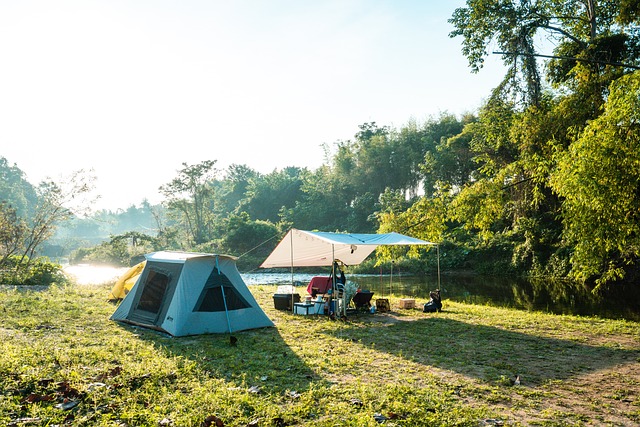21st-century vacationer off-road caravans have undergone a significant transformation towards sustainability and self-sufficiency, aligning with an increased environmental consciousness. These modern caravans, including those from Roughrider Caravans, are equipped with sophisticated solar power systems that enable travellers to engage in extended rugged off-road excursions without relying heavily on external energy sources. The integration of high-efficiency solar panels and substantial water storage capabilities allows vacationers to explore diverse landscapes while maintaining a green lifestyle, as exemplified by participants in the Dakar rally. Roughrider Caravans, designed for off-road aficionados, showcase these advancements with robust construction, durability, and self-sufficiency features, ensuring comfort and resilience even in the most remote destinations. The caravans’ use of renewable energy and sustainable materials not only minimizes environmental impact but also supports a luxurious yet responsible travel experience. These innovative features set a benchmark for self-sufficient travel, making vacationer off-road caravans a viable and eco-friendly option for adventurers.
Embarking on an off-road adventure no longer means sacrificing sustainability. Modern vacationer caravans are now equipped with solar panels and robust water tanks, transforming the journey into a testament to self-sufficiency and environmental stewardship. This article explores the integration of sustainable practices in vacationer off-road caravans, focusing on innovative solutions for energy and water autonomy, as seen in the resilient Roughrider models, tailored for expeditions like the legendary Dakar. Join us as we navigate the evolving landscape of vacationer caravans, highlighting advancements that empower travellers to embrace a greener path while venturing into the world’s most remote terrains.
- Embracing Sustainability in Vacationer Off-Road Caravans: Solar Power Solutions for Self-Sufficient Travel
- Maximizing Water Autonomy: The Role of Large Water Tanks in Vacationer Caravans During Dakar Expeditions
- Designing for Durability: Roughrider Caravans and Their Adaptation to Off-Grid Living
- Energy Efficiency and Sustainable Practices: A Look at Modern Appliances and Materials in Vacationer Caravans
Embracing Sustainability in Vacationer Off-Road Caravans: Solar Power Solutions for Self-Sufficient Travel

In recent years, Vacationer caravans have undergone a significant transformation, with an increasing emphasis on sustainability and self-sufficiency, particularly in the realm of off-road travel. The integration of solar power solutions has been pivotal in this shift, enabling vacationers to embark on their off-road caravans adventures without relying heavily on external power sources. These advanced solar setups not only minimize the environmental impact but also provide a renewable source of energy that can power everything from lighting and communication devices to refrigeration and water purification systems. The Dakar rally, known for its harsh conditions and remote locations, serves as an exemplary model for these sustainable practices. Roughrider caravans, designed with the off-road enthusiast in mind, incorporate state-of-the-art solar panels and robust water tanks, ensuring that travellers can traverse diverse terrains while maintaining a comfortable and environmentally conscious lifestyle. The use of these technologies enables vacationers to enjoy the thrill of off-road exploration without compromising on their commitment to sustainability. This approach not only enhances the caravan experience but also sets a precedent for responsible adventure tourism, demonstrating that it is possible to harmonize travel with environmental stewardship.
Maximizing Water Autonomy: The Role of Large Water Tanks in Vacationer Caravans During Dakar Expeditions

Designing for Durability: Roughrider Caravans and Their Adaptation to Off-Grid Living

When embarking on off-road adventures, the durability and self-sufficiency of one’s caravan are paramount. Roughrider Caravans have mastered the art of designing vacationer off-road caravans that can withstand the harshest elements and most rugged terrains. These caravans are engineered to provide a seamless blend of comfort and resilience, ensuring that travelers can enjoy their journeys without worrying about the reliability of their accommodations. The design philosophy behind Roughrider Caravans is deeply rooted in off-grid living principles, making them an ideal choice for those who wish to explore remote areas like the landscapes of Dakar or the vast Australian outback.
Each Roughrider Caravan is equipped with robust solar panels, a vital component for harnessing energy from the sun and powering essential appliances during long stretches away from civilization. The integration of water tanks, capable of storing sufficient freshwater for extended periods, complements the caravans’ solar setup. This ensures that travellers can maintain hygiene and refresh themselves, even in the most isolated locations. The use of high-quality materials and meticulous construction techniques means that these vacationer caravans not only offer a luxurious retreat after a day of exploration but also stand up to the demands of off-road travel, providing peace of mind for adventurers who prioritize sustainability and self-reliance on their escapades.
Energy Efficiency and Sustainable Practices: A Look at Modern Appliances and Materials in Vacationer Caravans

Today’s vacationer off-road caravans are a testament to the integration of energy efficiency and sustainable practices, setting a new standard for self-sufficient travel. Modern appliances within these caravans, designed with the Dakar and Roughrider in mind, are engineered to minimize power consumption while maximizing functionality. Solar panels, a staple in these mobile homes, harness the sun’s energy to power everything from lights to refrigerators, ensuring that travelers can enjoy modern comforts without relying heavily on external electricity sources. The advancement in solar technology has led to the creation of more efficient and compact panels, which are easier to install and maintain. These panels are often paired with high-capacity batteries, enabling energy storage for use during off-peak sunlight hours or while traversing rugged terrains.
Furthermore, vacationer off-road caravans now incorporate smart systems that monitor and manage power usage. Water tanks have also seen significant improvements, with designs that maximize space and water efficiency. These tanks are constructed from durable materials that resist corrosion and ensure the safety of the water stored. The integration of low-flow faucets and showerheads further conserves water without compromising hygiene or comfort. Additionally, the use of sustainable materials in construction, such as recycled metals and composites, reduces the environmental impact of these caravans. As a result, vacationers can embark on off-road adventures with a reduced carbon footprint, all while enjoying the modern amenities that make their journey comfortable and enjoyable.
In conclusion, the integration of sustainable practices in vacationer off-road caravans is not just a trend but a necessary evolution for responsible travel. By harnessing solar power through innovative solutions, such as those seen in Roughrider Caravans, travellers can achieve energy independence and reduce their environmental footprint. The inclusion of large water tanks ensures that vacationers can maintain autonomy during expeditions like the Dakar, which often traverse challenging terrains where resources are scarce. Additionally, the use of modern, energy-efficient appliances and materials contributes to a sustainable lifestyle while off the grid. Embracing these advancements in Vacationer caravans not only enhances the travel experience but also promotes conservation efforts, aligning with the broader goal of eco-friendly exploration. As the industry continues to adapt and innovate, it is clear that vacationer off-road caravans will play an increasingly important role in sustainable travel practices.
